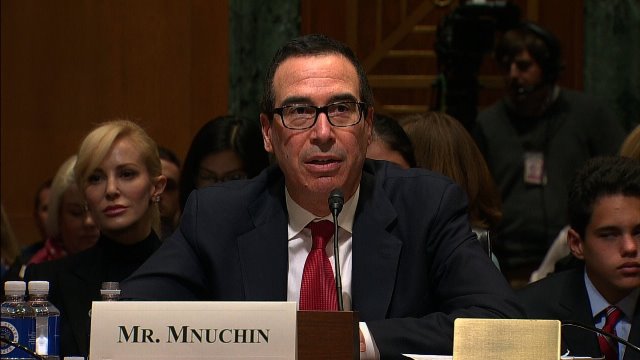Tea Party members and other fiscal conservatives might want to take note: President-elect Trump’s Treasury pick would like to raise the debt ceiling … soon and without drama.
“Honoring the U.S. debt is the most important thing. … I would like us to raise the debt ceiling sooner rather than later,” Steven Mnuchin said during his confirmation hearing before the Senate Finance Committee Thursday.
It’s one of the first issues Mnuchin will have to address as Treasury Secretary, should he be confirmed.
His response to questions about the debt indicated he’s not eager to see a crisis over the issue unfold the way it did in the summer of 2011 when some conservative lawmakers refused to raise the ceiling until their budget demands were met. The standoff — which put the country on the brink of default — earned the United States its first-ever credit downgrade and roiled markets.
The ceiling is a legal cap that Congress periodically sets on how much the U.S. government may have in outstanding debt.
Since the federal government takes in less revenue than lawmakers have committed to spend, the U.S. Treasury must borrow to make up the difference to pay all the country’s obligations in full and on time.
Treasury can’t do that when the level of borrowing hits the ceiling, unless lawmakers vote to raise it again or, as they’ve done repeatedly in recent years,”suspend” it. A suspension basically lets Treasury borrow whatever it needs to pay the bills and when the suspension ends, the new ceiling is set at the amount of outstanding debt that day.
That’s likely to be just north of $20 trillion when the latest suspension ends on March 15. At that point, the Treasury Secretary will have some accounting tools at his disposal to keep the amount of debt just below the legal ceiling. But those so-called “extraordinary measures” aren’t likely to buy lawmakers more than a few months to address the issue, according to estimates from the Bipartisan Policy Center.
Mnuchin also made it clear that he doesn’t believe that the Treasury should try to “prioritize debt” if Congress threatens not to raise the ceiling in time, as some lawmakers have suggested. The idea is that Treasury could avoid a technical default on the debt so long as it paid interest to bondholders first, and then paid all other obligations — everything from Social Security checks to veteran benefits to contractor bills — whenever it had sufficient money in hand.
“We have the obligation. There should be no uncertainty that we are paying the bills,” Mnuchin said.
Most independent fiscal experts argue that trying to prioritize debt is a terrible idea that could harm the economy, world markets and ruin the United States’ gold-star reputation as the world’s most reliable, liquid debt market.
